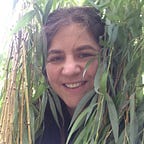Why Don’t My Kids Like The Books I Liked?
The books I liked as a kid were old even by the time I read them, so it’s understandable they have no interest
One of the things you have to get your head around as a parent is that your child’s experience of childhood is theirs, not yours. You may want to share with them the things that you enjoyed, but you must do so in the knowledge that this may not be appreciated — when they are younger because they don’t understand about nostalgia and sensitivity as they throw your beloved baby toy across the room in disgust, and when they are older as a deliberate declaration of their independence.
Still, I thought sharing books would be a joy for both parties. What I didn’t realise is that many of the books I enjoyed myself in the 1980s and 1990s were already archaic by then, using the language and societal norms of an earlier age. While this still worked one or two generations on, the lives of my own children are too far removed, and technological changes — phones! the internet! — means that these books are now enjoyable more as history books than as stories.
The beginning of the UK’s first coronavirus lockdown, however, coincided with the release in the UK of the television series of ‘Malory Towers’, Enid Blyton’s boarding school series first published in 1946. And so my daughter and I began what we thought would be a short-lived curtailment of everyday life with a daily dose of life in a glorious post-war English boarding school. Modernised enough for today’s kids, the series still mostly stuck closely enough to the original characters and storylines that both my daughter and I were happily watching it together, and the post-war setting seemed to chime well with the initial mood of the UK’s lockdown, of us all, pulling together to get through this crisis.
I have had less luck persuading my daughter to read the original books — and I have gradually come to accept that just because I always loved them does not mean she will. After all, I can already see how books and authors go in and out of fashion, and if the current wave of anti-JK Rowling sentiment continues, I can see, for example, that her kids may not appreciate the books my daughter currently enjoys so much. I have come to accept that my job as a parent is not to tell my children what to read but to encourage them to find out what it is that they want to read.
Nevertheless, there are three books I have not yet given up on trying to sneak in while we are still at the stage of reading books together, all beloved by me in my childhood. I’ve just ordered copies of all three, and I am hopeful we’ll find at least one that works for us both.
Thursday’s Child by Noel Streatfeild
It’s hard to find a woman my age who didn’t love ‘Ballet Shoes,’ about the orphaned Fossil sisters and their adventures as child actors in order to help their guardian, Sylvia, with their desperate financial situation, despite the book being over fifty years old by the time I read it. I watched the 2007 adaptation starring Emma Watson alone recently, in case it became subject to my kids’ derision and ruined it for me, but I needn’t have worried — it was perfect. I liked Streatfeild’s other ‘shoes’ books too, particularly ‘White Boots’ (published as ‘Skating Shoes’ in the US), but my absolute favourite of her books was always ‘Thursday’s Child,’ with its courageous heroine Margaret, with her three of everything and tales of life on the canals. I’ve recently found out there was a tv adaptation of ‘Thursday’s Child’ in the 1970s, though I am yet to source a copy, and I know I read the sequel in my twenties, but that was entirely unmemorable, whereas I could practically quote the whole of ‘Thursday’s Child’ word for word even now.
Jill’s Gymkhana by Ruby Ferguson
The beauty of the Jill series of books is that they made ponies interesting even for city dwellers like me, as we learn about horses alongside Jill, who has also never ridden before when she first moves to the countryside. Soon words like ‘gymkhana’ seemed normal, and even though I couldn’t identify with the idea of winning a rosette for riding a pony, the friendship issues and stories around fitting in are pretty universal. There are nine books in this series, all published in the 1950s and early 1960s, and selling for quite high prices on eBay, though I found a copy of the first book at a reasonable price from a different second-hand outlet.
The Little Gymnast by Sheila Haigh
Gymnastics first captured my imagination with images on the television from the 1984 Olympics in Los Angeles, aIl sparkly costumes, and breathtaking tumbles. So it makes sense that I loved this story of Anda, a young girl from a poor family who shows huge promise at gymnastics but whose family finds it hard to finance her dreams. Like Darrell Rivers in ‘Malory Towers,’ Anda has just the right amount of sass, which, combined with her talent, determination, and position as the underdog made this a great book for pre-teen me, despite even a cartwheel being beyond my capabilities.
